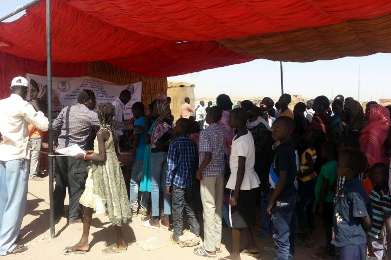UNHCR steps up efforts against statelessness in S. Sudan
June 13, 2018 (JUBA) – The United Nations refugee agency (UNHCR), working jointly with the Directorate of Nationality, Passports and Immigration (DNPI) of South Sudan and Forcier Consulting launched on Wednesday a study on statelessness in the war-torn nation.

Among major risks of statelessness in South Sudan, the Study particularly emphasizes state succession, procedural gaps and divergent application of provisions in the Nationality Law for some specific ethnic and minority groups, the lack of a civil registration system, underfunded state institutions as well as ongoing conflict.
“Some categories of population in South Sudan are particularly at risk of statelessness. While many vulnerable and low-income individuals face difficulties in acquiring nationality certificates due to costs and procedures throughout the application process, challenges to obtain a nationality certificate also relate to ethnicity,” partly says the study.
It adds, “Certain communities, such as nomadic pastoralist groups, cannot access nationality certification procedure as they are not considered to be South Sudanese which effectively renders them stateless”.
UNHCR’s activities relating to prevention of statelessness in South Sudan have focused so far on training and capacity-building for DNPI, support to vulnerable groups in the procedure of age assessment and acquisition of nationality and advocating for improved legal framework to address statelessness in the country.
“Since 2012, UNHCR has assisted some 12,000 persons at risk of statelessness to acquire South Sudanese national certificates. In addition, over 300 officers from the Directorate of Nationality, Passports and Immigration participated in various trainings organized in 2017 by the UN Refugee Agency,” said Johann Siffointe, UNHCR Representative for South Sudan.
To address the risks of statelessness in South Sudan, UNHCR will continue to advocate with the State and national authorities of South Sudan for ratification of the 1954 Convention relating to the Status of Stateless Persons and the 1961 Convention on the Reduction of Stateless. UNHCR will continue to provide assistance to the Ministry of Interior and DNPI in necessary legislative reform based on the findings and recommendations of the Study.
“While no reliable data on the number of persons at risk of statelessness in the country is available, in 2018, UNHCR aims to assist some 4,000 persons in acquiring nationality certificates, giving priority to the most vulnerable persons, including internally displaced persons, South Sudanese refugee returnees, ethnic minorities, children and adolescents in educational institutions”, the UNHCR Representative emphasized.
On November 4, 2014 UNHCR launched #IBelong campaign to end statelessness by 2024, featuring a Global Action Plan for 2014-2024 that has the following objectives: resolve existing major situations of statelessness; prevent new cases of statelessness from emerging; and better identify and protect stateless populations.
(ST)
